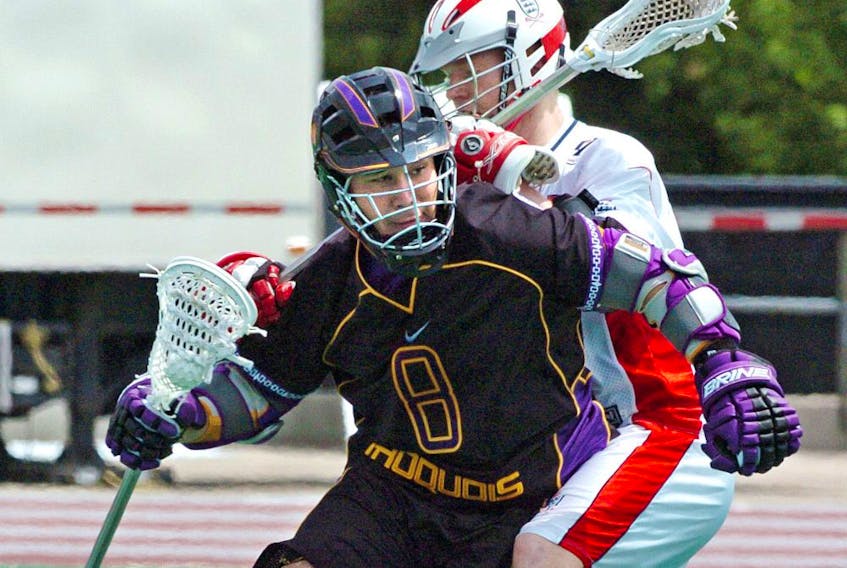On Wednesday, Ireland’s national lacrosse team announced that it had agreed to voluntarily withdraw from the 2022 World Games in Birmingham, Ala., which are a sort of sub-Olympics for sports not part of the big Olympics. I know what you’re thinking, but this isn’t a depressing coronavirus story. For once.
Ireland’s team and its national lacrosse federation are opting out to make room in the eight-team tournament for the Iroquois Nationals, who compete independently in international lacrosse, and who are recognized as the inventors and custodians of the game. Needless to say, they excel at the modern version of the sport: the Iroquois/Haudenosaunee have finished third in the last two quadrennial world championships ― competitions at which Ireland finished 10th (2014) and 12th (2018).
The 2018 World Games featured 46 national teams. But the World Games are, by design, run inexpensively: they even have a positive rule against the construction of new facilities for the event. They are a recognized partner of the International Olympic Committee (IOC), serving as a testbed for sports on the cusp of Olympic inclusion. Lacrosse, with its North American following and a bit of history (1904-1908) as a full Olympic sport, will be one of the bigger deals, what with the games taking place in the United States.
So why weren’t the Iroquois on the eight-team list in the first place? The International World Games Association (IWGA) had made an initial decision to stick to the IOC rule incorporated into the Olympic Charter in 1996: participant countries are “independent state(s) recognized by the international community.” Within lacrosse, this was widely recognized as a disgrace, or at least its strict application to lacrosse was, and the IWGA was forced to back down in the face of a global clamour.
The Irish team usually features American college students of Irish ancestry, and the Irish governing body of the game did not, one assumes, require much persuading of the importance of the concept of nationhood. “It’s simply the right thing to do,” said Ireland Lacrosse CEO Michael Kennedy of the decision to bow out. “As much as our players would have been honoured to compete, we know the right thing is for the Iroquois Nationals to represent our sport on this international stage.”
Unvarnished nobility of this sort is rare. But Ireland’s gesture calls attention to a problem further down the road. World Lacrosse, the sport’s international governing body, is in the midst of a prolonged plan to get lacrosse back into the Olympics with full credentials. A key step was taken in 2018, when World Lacrosse received “provisional” recognition from the IOC.
The 2028 Summer Olympics, which is scheduled to be held in Los Angeles, have been on the radar as the most natural time for this to happen, especially since the list of Olympic sports is now treated as more flexible than in the past, and can be tailored to suit host countries. (Gen X kids, I hope you’re ready for competitive breakdancing at the 2024 games in Paris, because that’s a thing that is happening. And for the 1990s kids? Skateboarding!) There is design work underway on a third version of lacrosse designed to be a tad more accessible for a global TV audience.
But the IOC will definitely not want to relent on its general rule about what counts as a country. There are a dozen sub-national regions and nations with separatist movements that have “unrecognized” Olympic committees already. Macau has been beating down the IOC’s door since 1987; Catalonia, Gibraltar, Kurdistan, and many others are queued up right behind. All of which is a garrulous alternative way of saying the phrase “can of worms.”
Can the IOC be persuaded that a rule is not to be mistaken for a principle, and admit the Haudenosaunee as a competitor for the purposes of, and to accommodate the traditions of, one particular sport? It would be unlike them to behave so decently, wouldn’t it? Lacrosse ought to be at the Olympics, especially if breakdancing is, but Ireland’s gesture suggests that if the Iroquois can’t go, there may be trouble between the commercial managers who want to grow the sport and the people who play it.
National Post
Twitter.com/colbycosh
Copyright Postmedia Network Inc., 2020









